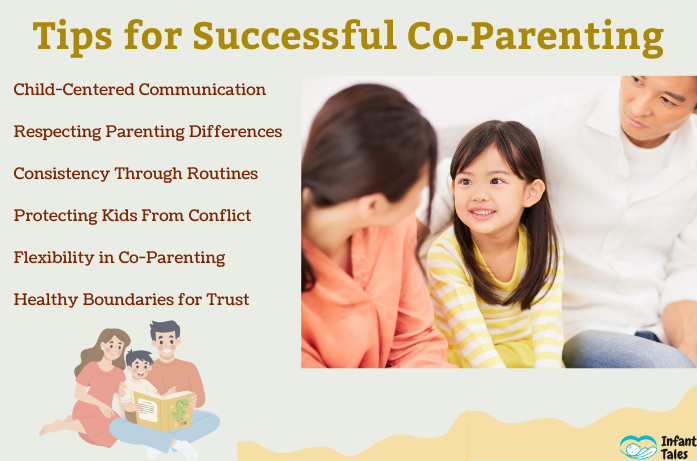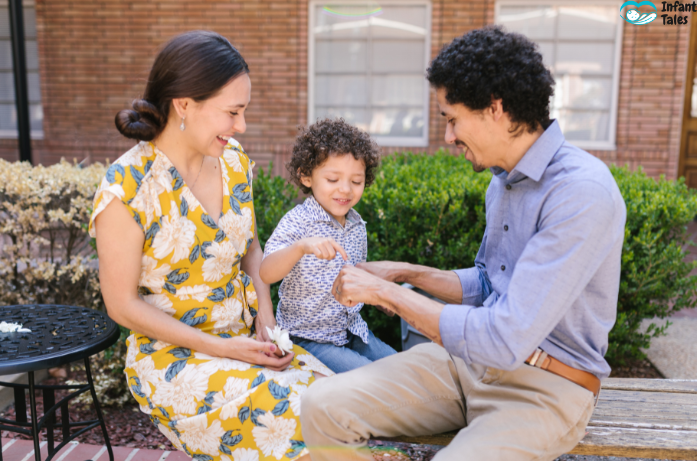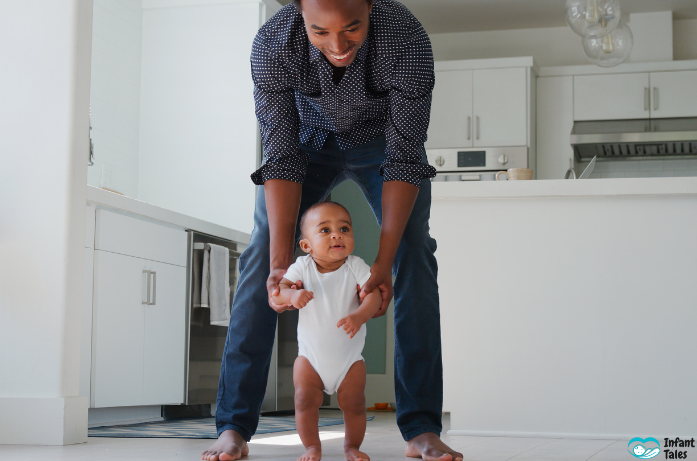By a caring mom at Infant Tales
Parenting is a journey of love, responsibility, and hardships. Straddling the dynamics of two parents from separate households, co-parenting after divorce or separation tends to add enormous complexity to the journey. Yet, co-parenting is not about perfection; rather, it is about forming a stable, nurturing, and consistent environment for children while family structure concerns differ.
This article will discuss what co-parenting is, the common co-parenting challenges parents face, strategies for successful co-parenting after divorce, and why putting the child first could completely change family life.
What Is Co-Parenting?
Co-parenting describes situations in which two parents, after separating or divorcing, continue to share the responsibilities of raising the children. They work together instead of competing to provide consistent care, stability, and guidance for their children.
Studies from the American Psychological Association (APA) point out that cooperative co-parenting helps reduce children’s stress levels and gives rise to better social, emotional, and academic results. Children thrive when parents keep conflicts away from them and pursue mutual parenting goals together.
The Challenges of Co-Parenting
Co-parenting can sound so simple in theory, yet the reality comes with its own complexities. Among the most frequent co-parenting challenges include:
- Communication issues: Past arguments affect how parents speak to each other.
- Different parenting styles: One parent could be strict whereas the other is easier.
- Schedules and logistics: Managing school, activities, and holidays using two homes can be stressful.
- Emotional strain: Letting go of past conflict to put one’s child first requires work and maturity.
Guidance on overcoming common co-parenting challenges highlights ways parents can stay focused on the bigger goal of raising children into healthy and happy individuals.
Why Co-Parenting Matters
Children do best when they feel secure, loved, and supported by both parents. Robust co-parenting ensures that:
- Children witness an act of cooperation and respect, even under tough conditions.
- Children retain strong bonds with both parents.
- Emotional security is strengthened, lowering risks of anxiety and behavioral problems.
- Consistency in rules and routine helps kids when settling into the lifestyle with two homes.
The National Institutes of Health (NIH) suggests that supportive parenting and stability play crucial roles in a child’s long-term mental and emotional health.

Tips for Successful Co-Parenting
For parents looking for practical strategies, guides on co-parenting tips for divorced parents provide advice on communication, routines, and reducing conflict while raising children across two households.
1. Keep the Conversation Child-Centered
When conversing with your co-parent, try to never focus on past disagreements or matters unrelated to the needs of your child. By using parenting tools or shared calendars, life can be made much easier and less stressful, allowing both parents to remain in the know without unnecessary arguments. Communicate clearly and respectfully to keep the kids in the forefront.
2. Respect Differences
You and your co-parent are bound not to agree on many issues, and this is perfectly normal. What matters are the issues you do agree upon: education, health, and discipline. The minor issues could be anything from the bathtub time to snacks. Children adapt well and actually learn to become flexible observing their parents respecting differences.
3. Create Consistent Routines
A kid thrives when life is set around predictability. Establishing routines that reflect one another in both homes, such as bedtimes, schoolwork, and rules on screen time, affords children a sense of stability. While it might not be feasible for the households to be completely synonymous, aligning core routines for both is an important step in giving kids that secure feeling, which greatly refines their environment by reducing stress.
4. Keep Kids Out of the Middle
Children should never bear the burden of passing messages or refereeing between their parents. This puts stress on them. Instead, all communication back and forth should be conducted directly with the co-parent. Protecting the children from conflict provides a safe space for them to feel loved and free from adult concerns.
5. Stay Flexible
Life does tend to throw these curveballs at kids: illness, last-minute school events, or work commitments. Flexibility should be a mark of respect and reduction in stress to all, setting an example for the child. When parents work together and respond with kindness while juggling schedules, children will always have a safety net even when things aren’t planned perfectly.
6. Set Healthy Boundaries
Respecting each other’s parenting time is essential. Healthy co-parenting boundaries don’t imply distance, but clarity and trust. Don’t interfere with the time the other parent spends with the child, and expect those same boundaries to be respected in return. Kids win when clear boundaries lead to quality time while keeping parents from stress.
The Role of Extended Family and Community
Successful co-parenting doesn’t just involve the parents. Other family members, teachers, and community support options may also need to be involved. Grandparents, relatives, or mentors can help children adjust and create a strong support team. These strong support systems provide emotional stability, guidance, and practical help, which ease stress and promote healthier social and emotional development.
Research published on PubMed Central shows that children with a broader network of supportive relationships tend to manage life transitions more effectively.
When Co-Parenting Feels Impossible
Sometimes, despite all efforts, co-parenting becomes unbearable. In high-conflict situations, such as ongoing court disputes or abusive relationships, the security of dual co-parenting can be jeopardized.
In such situations, the best option may well be parallel parenting, where interaction is kept to the minimum. Professional interventions like family therapy or mediation could help in reestablishing a healthy co-parenting relationship.
If there are any legal and mental health concerns, parents should seek advice from a qualified professional.
Building a Positive Future
It is co-parenting at the center of which is established a better future for children. While it’s hard to do, many families find that they co-parent more easily as time goes by.
At the center of co-parenting is building a promising future for the kids. While the adjustment phase may be tough, many families say it only grows easier as they go along. What matters at the end of the day is that the children feel loved, safe, and supported in both houses.
Final Thoughts
Co-parenting needs patience, compromise, and a child-first mindset. Admittedly, it is hardly an easy route, but the opportunities for growth could be enormous, creating a nurturing setting to assist children in thriving.
Building on consistency, respect, and effective co-parenting communication, parents can journey the winds of co-parenting with resilience and grace. Never forget, co-parenting is not about being perfect-it’s about showing up for your child, together!
FAQs
1. What is co-parenting?
It means both parents carry on sharing responsibilities for raising their child after separation or divorce.
2. Why is co-parenting important?
It is an important factor for the child, as it offers them with stability, love, and potential relationships with both parents.
3. What can I do to make co-parenting better?
Make it all about the child; keep communication straightforward and consistent.
4. What should I avoid in co-parenting?
Do not argue or fight in front of the children, use them as messengers, or say negative things about the other parent.
5. Can co-parenting reduce stress for kids?
Absolutely. When parents work together, children feel safe, supported, and less anxious.
Disclaimer: This article is for information purposes only. It is not a substitute for professional legal or psychological advice. Parents who find themselves in a messy high-conflict situation or question the safety of their children should seek consultation from a qualified professional.
Parenting has never been easy; with two homes in the picture, it poses even more difficult circumstances. But when done correctly with patience, consistency, and love, co-parenting becomes a method to help children thrive.
👉 For more parenting tips, guidance from real-life situations, and supportive-worthy reading, visit Infant Tales.



